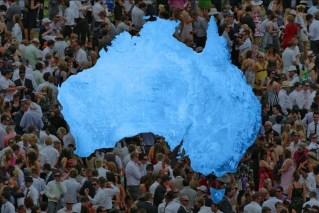One year on: Four ways Russia’s invasion of Ukraine changed the world

It has been one year since Russia launched a full-scale invasion of Ukraine.
The move didn’t come out of the blue; tensions between the two former Soviet Union members had been simmering for years, erupting in 2014 when Russia invaded and annexed the Ukrainian peninsula, Crimea.
When Russia invaded again on February 24, 2022, it put the strength of Ukraine, and the West’s willingness to intervene, to the test.
It also set into motion flow-on effects that would be felt around the world, in terms of both geopolitics and economics.
“I think [Putin’s] calculation was the West was weakened, divided,” said Australian National University Strategic and Defence Studies Centre associate professor Matthew Sussex.
“His other calculation was that the Ukrainians wouldn’t fight … and his third calculation was that the Russian Armed Forces were a high-quality military organisation.
“He’s been proven wrong on all three of those things.”
With no end to the Russia-Ukraine conflict in sight, here are four ways the war changed the world over the past year.
Ukrainian allies came together
When his country woke to ballistic missiles heralding the first day of Russia’s invasion, Ukrainian President Volodymyr Zelensky had a key message for Putin.
“The West is with us.”
A year on, the message has been underscored by a surprise visit US President Joe Biden paid to Ukraine this week in a major show of support ahead of the one-year anniversary of the invasion.
The level of global support has proved costly. A database tracking military, financial and humanitarian aid to Ukraine shows the US has taken the lead in supporting Ukraine.
Government-to-government commitments supporting Ukraine totalled €143 billion ($222.5 billion) between January 24, 2022, and January 15, 2023 – the US contributed more than 50 per cent of that figure.

Source: Kiel Institute for the World Economy
When first threatening to invade, Mr Putin decried the expansion of NATO, whose member states had supported Ukraine following the annexation of Crimea by supplying military aid ranging from missiles to armed drones.
In the lead-up to the invasion, Russia demanded a legal guarantee that Ukraine be denied NATO membership, even though the alliance had no plans to welcome Ukraine into its ranks in the near future.
Now Russia may have knocked down the wall it was trying to build; Ukrainian defence minister Oleksii Reznikov indicated the country sees itself as a “de facto” NATO member following waves of support from member countries throughout the invasion.
Finland and Sweden have also made moves to join NATO following Russia’s invasion of Ukraine.
“Sweden have said, ‘Well, previously [we were] neutral, now we want to join because we feel threatened’,” Dr Sussex said.
“The type of picture that Putin painted about Russia surrounded by adversaries is something that he’s brought about by his own actions.”
He said all sides of the conflict are playing for high stakes; Ukraine for its survival, Russia for its political skin, and the West for its credibility.
Energy crises abound
Global energy markets had already begun tightening in 2021 due to a variety of factors, including disrupted supply chains and the rapid post-pandemic economic rebound.
Then Russia’s invasion of Ukraine ramped up the pressure.
EU member countries have decreased their dependence on Russian gas from 35.7 per cent in February 2022 to 12.9 per cent in November.
This is a major decision given more than 30 per cent of households in the EU use gas to heat their homes.
Countries that helped fill the gap left by Russia included Norway, Algeria, the US, Qatar and Nigeria, among others.
Russia did not take the hit lying down; Mr Putin announced foreign buyers must pay in rubles for Russian gas from April 1 in an attempt to boost the local currency, and Russian energy firm Gazprom indefinitely halted the flow of gas to Western Europe through the Nord Stream 1 pipeline, officially blaming equipment malfunctions.
Russia is the world’s second largest exporter of crude oil, but Western governments also capped the price of Russia’s oil exports in an attempt to hit the latter’s pockets, and the EU imposed a boycott on most Russian oil, with the support of Group of Seven nations and Australia.
The cost of the energy back and forth has hit several countries hard.
For example, a study has found the energy crisis stemming from the war in Ukraine has cost every adult in the UK the equivalent of £1000 ($1767).
Germany previously relied on Russia for 55 per cent of its gas and more than a third of its oil.
It has since been forced to reopen coal-fired power plants, delay plans to shut down nuclear power plants, and increase storage capacity for gas imported from other countries.
“The fact that Germany has managed to virtually wean itself off Russian energy is something that’s been … very, very painful,” Dr Sussex said.
“That takes away a key plank of Russian leverage, and I think that’s really quite significant.”
Grain prices rose and fell
Russia’s invasion drove up food prices globally, as Russia and Ukraine account for almost a quarter of the world’s wheat exports, and are also major exporters of maize, barley and other grains.
After an initial dip in wheat, maize, and barley prices in the days following the invasion, prices rocketed up, only easing and declining towards the end of the year.
David Ubilava, associate professor of economics at University of Sydney, said prices levelled off thanks to geographic diversity, so other suppliers could step up and fill the gap left by the warring countries.
Grain prices certainly factor in the cost of meat and eggs, but Dr Ubilava said long-running effects from the pandemic, animal diseases and weather disruptions were more to blame for the rising prices those products saw in many countries last year.
But in countries in which ingredients like wheat contribute more to product costs (compared to a country like Australia, in which the cost of a loaf of bread is usually led by the cost of labour), the financial hit was more acute.
Staple food prices in sub-Saharan Africa rose by an average 23.9 per cent in 2020-22 – the biggest surge since the 2008 Global Financial Crisis.
The price of fertilisers (which Russia and Ukraine are major producers of) also more than doubled in Kenya, Uganda, and Tanzania in 2022.
Russia’s standing weakened
Russia’s actions have left it an international pariah, and weakened its standing even among its allies.
This week China and Russia vowed to deepen their ties, but the countries are not on an equal footing; Russia needs China far more than China needs Russia.
China’s antagonistic behaviour means it’s not exactly a favourite of other major countries around the world, but it has refrained from the outright acts of war that Russia has displayed (although it holds a similar sense of ownership over Taiwan that Russia holds of Ukraine).
Russia may have been a junior partner to China for a while, but the former’s invasion of Ukraine has made the distinction more stark and put China firmly in the driver’s seat.

Chinese State Councillor Wang Yi and Russia’s President Vladimir Putin met ahead of the first anniversary of Russia’s invasion of Ukraine. Photo: AAP
“China benefits from the large number of natural resources and energy that Russia could provide,” Dr Sussex said.
“But in order to be able to meet Chinese, and Asian, demands for those resources, Russia is going to need a huge amount of investment in its minerals and extractive technology sector – and who’s going to provide that but the only player in town, China.
“So China now gains a really significant amount of influence over Russian strategic decision making when it comes to economic policy, and even potentially security policy down the track, too.”








